Disclaimer
Gaius Valerius Catullus
Roman Poet
ca. 84 - 54 BCE
Vivamus atque Amemus!
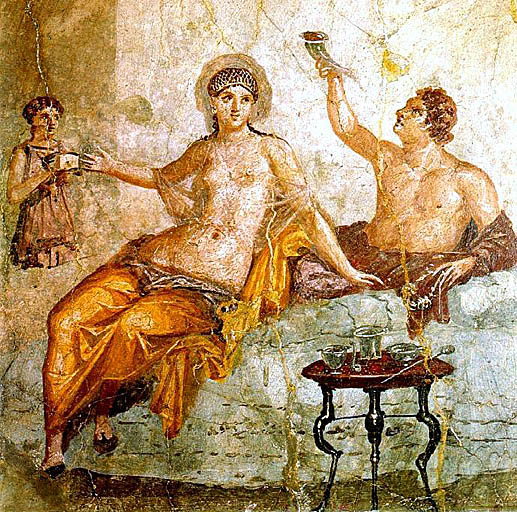
Gaius Valerius Catullus (ca. 84-ca. 54 BC) was a Roman lyric poet. He is best known for the intense poems which reflect various stages in his love affair with "Lesbia."
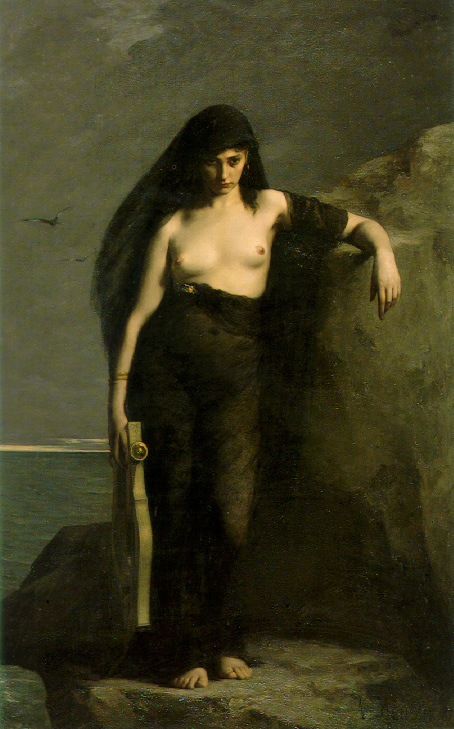
My Lesbia
Let us live, my Lesbia, and let us love,
and let us judge all the rumors of the old men
to be worth just one penny!
The suns are able to fall and rise:
When that brief light has fallen for us,
we must sleep a never ending night.
Give me a thousand kisses, then another hundred,
then another thousand, then a second hundred,
then yet another thousand more, then another hundred.
Then, when we have made many thousands,
we will mix them all up so that we don't know,
and so that no one can be jealous of us when he finds out
how many kisses we have shared.
Catullus belonged to a circle of neoteroi, or "new poets," who used as their models the learned Greek poet-scholars at Alexandria in the Hellenistic period and wrote elegant, allusive, and highly finished poems on love, mythology, and other topics. They cherished the epithet docti, "learned." Catullus's friends were the poets C. Licinius Macer Calvus, Furius Bibaculus, and C. Helvius Cinna; the orator Q. Hortensius, Cicero's rival in the law courts; and the biographer Cornelius Nepos, to whom Catullus dedicated his book of poems.
The Death of Quintilia
FORSITAN hoc etiam gaudeat ipsa cinis.

The Roman poet Catullus wrote and addressed this poem to his friend Calvus on the premature death of his wife or mistress, Quintilia. According to Sextus Propertius (Elegies 2.34.89-90), Calvus himself wrote an elegy for her, which Catullus may be responding to; Calvus' fragment forsitan hoc etiam gaudeat ipsa cinis may be part of this elegy.
Catullus' Poem to Calvus
If anything grateful or pleasing to silent tombs
is able to happen from our grief, Calvus,
by which longing we renew old loves and
we weep for the long departed friendships,
certainly her untimely death is not such great grief
for Quintilia as she rejoices in your love.
Yet, this poem also written by Catullus to Calvus brings another element into their relationship. Vatinius, an intolerant bigot even for his times, was a man Calvus prosecuted in court. Catullus jokes that the book of bad poetry was Calvus' payment for his capacities as lawyer to Sulla. Sulla was not the most beloved of his Roman contemporaries.
If I did not love you more than my eyes,
most delightful Calvus, I would hate you
with a Vitinian hatred because of that gift of yours:
for what did I do or what did I say,
why do you ruin me with so many bad poets?
May the gods pile many adversities on that client,
who sent to you such a pack of sinners.
But if, as I do suspect, this new and choice
gift does Sulla the schoolmaster give you,
I am not upset, but rather well pleased,
since your labors haven't been wasted.
Great gods above, that horrible and cursed little book!
Surely you sent it to your Catullus,
so that he might die, again and again, on that day,
during the Saturnalia too, the best of days!
It won't end like this for you, oh no, my clever one.
For, if there is light, to the booksellers'
shelves will I dash, and Caesius, Aquinus,
Suffenus, the entire poisonous collection:
I will repay you with these punishments.
You bad poets, meanwhile, farewell, get out of here,
go to that place, from where you got your bad feet.
Curses of our time, very bad poets.
These are two poems written to Furius Bibaculus both a friend and fellow poet. Both men used satire to its best effect. Yet, I wonder if there is not much more to be read in words between two men. I always told my students when I was able to teach that we make a strategic error in understanding and appreciating the Romans if we can only see them through the bias and preconceived attitudes of a society so far removed from who they were.
Senex Magister
I'll bugger you and stuff your gobs,
Aurelius Kink and Poofter Furius,
For thinking me, because my verses
Are rather sissy, not quite decent.
For the true poet should be chaste
Himself, his verses need not be.
Indeed they've salt and charm then only
When rather sissy and not quite decent
And when they can excite an itch
I don't say in boys but in those hairy
Victims of lumbar scleriosis.
Because you've read of my x thousand
Kisses you doubt my virility?
I'll bugger you and stuff your gobs.
O you who are the youthful flower of the Juventius family,
not only of these, but however many either were
of after this will be born in later years,
I would prefer you to give wealth to that Midas
who has neither servant nor money-box,
than you allow yourself like this to be loved by that guy
"Who? Is he not good-looking?" you ask. He is.
But to that good-looking man belong neither servant nor money-box.
Throw it away and make light of this as much as you want,
but nevertheless that man has neither servant nor money-box.

Catullus was born in Verona. St. Jerome gives the year 87 B.C. and says that he died at age 30. Since events of 55 B.C. are referred to in several of Catullus's poems, however, and no poem can be said with certainty to be later than 54, scholars accept the dates 84-54. Catullus's family was prominent and well-to-do. They owned a villa at Sirmio, and his father entertained Caesar when the later was governor of Gaul.
When Catullus went to Rome in 61, he met and fell in love with Clodia, the "Lesbia" of the poems, who was a member of the old aristocratic Claudian family and the wife of Metellus Celer. For this upper-class sophisticate 10 years older than Catullus, the young poet from Verona was but another liaison in her constant search for diversion.
Lesbia says many bad things of me in front of her husband:
These are the source of greatest joy for that inane ass.
Fool, do you perceive nothing? If she could forget me and shut up,
She'd be sane: now because she whines and slanders me,
Not only does she remember me, but, what is oh so much worse,
She is angry. That's that, she burns even as she speaks.
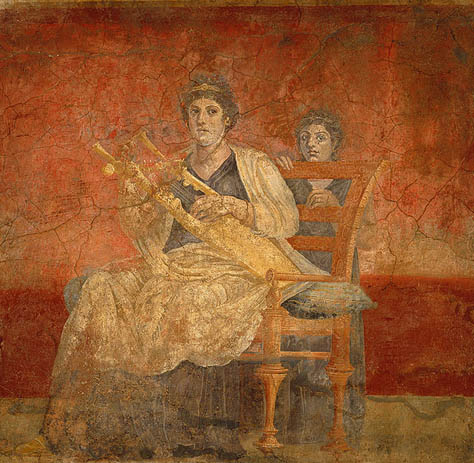
After a brief affair Clodia replaced Catullus with Caelius Rufus, who traveled in the same fast set as Catullus and was a protégée of Cicero. When Caelius threw her over (a new experience for her), Clodia brought charges against him in order to ruin him politically and socially. Cicero defended him in a masterpiece of character assassination (Pro Caelio) in which he repeated the rumors that Clodia had murdered her husband and slept with her brother and implied, among other things, that she was an insatiable prostitute. Before accepting as true Cicero's portrait of Clodia, one must remember that at one time the orator had thought of divorcing his wife in order to marry her. Whatever this woman was like, Catullus' experience with her was the source of some of the finest Latin lyric poems.

Whom do you think this woman could be?
In 57 Catullus went to Bithynia on the staff of Memmius, who was to be governor of that Eastern province. While there Catullus traveled to the Troad to perform rites at the tomb of his brother, who had died in the East, recording this act of devotion in a moving poem. After a year in Bithynia he returned to Italy and probably lived in Rome the rest of his life. Despite complaints of poverty in his poems, he seems to have owned a villa near Tibur (modern Tivoli).
Bithnia held out very few delightful moments for Gaius Valeris, and in these two poems Catullus pours abuse on Memmius for treating his subordinates badly.

My Varus lead me at leisure
from the forum to see his girlfriend
little whore, as it was them seen by me immediately
she is not very uncharming neither is she unattractive.
As we came there, several conversations fell
upon us: among which what now
Bithynia was; how it was holding itself;
and with what money had it profited me.
I responded that which was none, neither for the natives of Bithynia
nor for their governers not for their staff,
with which anyone could have a more richly combed head of hair
especially when those whose governer was a shithead
who also didn't value his staff worth a hair
"But certainly however" they said "that which is said
is the custom there to be born, you obtained
men for a litter" I, like one lucky fellow
in the eyes of the girl said
"It was not so bad for me,
although, a bad province fell to me,
that I was not able to prepare 8 strong men."
But for me no one was in the place nor there,
who could put the broken legs of an old cot
on his neck.
At this point, as it was appropriate for the shameless one,
"I ask you please" she said "for me, my Catullus for a little while
lend me those litter bearers, for I wish
for them to carry me to the temple of Serapis.
"Wait," I say to the girl,
"what which I had said good judgement
must have escaped me
Cinna Gaius prepared it - but whether
the litter bearers belong to me or to you?
Use as well as if I had prepared them for myself.
But you without salt are bad and bothersome,
through that it is not permitted to be careless!"
Friends of Piso, unprofitable staff,
with light knapsacks ready and unencumbered,
the best Veranus and you my Fabullus,
what do you make of things? Is it not enough
that you endure your hunger with that flat and cold wine?
Does it show in the account books anything of small profit
that has been paid out, as I chalk up what was paid out
by me, who followed my leader, as small profit?
O Memmius, for a long time you made me, supine, suck dick
well and also slowly with that whole shaft.
But, as far as I can tell, you all were in the same
situation: for you were stuffed with a penis no less
erect. Seek noble friends!
And yet to you let the gods & goddesses give many
bad things, disgraces of Romulus & Remus.
The collected 116 extant poems--18 to 20 are spurious--while arranged neither by chronology nor by subject, can be divided into three categories: The first, poems 1 through 60, is a group of short poems in various meters, with the hendecasyllabic and "limping" iambic predominating, among which are love poems, erotic poems, lampoons, and poems on a variety of other topics. The poems 61 to 64, the second group, are longer poems, including two wedding hymns (61 and 62); the Attis poem (63), about a youth who emasculates himself in order to become a priest of Cybele, then regrets his act; and the "Marriage of Peleus and Thetis" (64), an epyllion, or little epic, of some 400 hexameters.
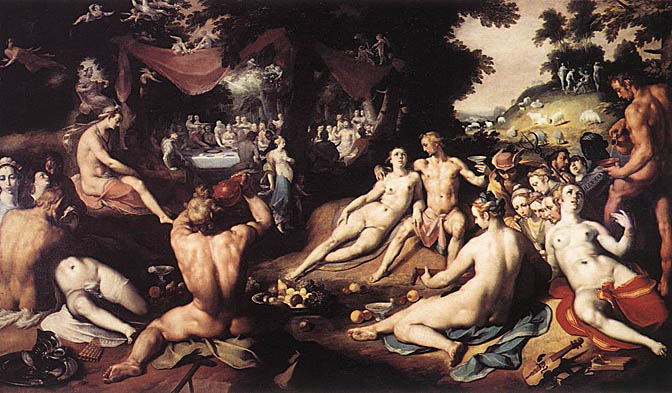
The Wedding of Peleus and Thetis
The pine trees erstwhile grown on Mt. Pelion's summit are
said to have floated on Neptune's clear waves to Phasis,
Aeëtean land, when the fittest young men, the glory of
Argive manpower, dared travel over the sea's briny waters on
a rapidly moving ship as they swept the deep blue expanse
with wooden oars, because they hoped to steal the Golden
Fleece from Colchis. Athena Polias, holding fast the
citadels on the cities' summits for the Argonauts, made a
ship that moves rapidly with a light gust of wind, joining
pinewood frameworks for a curved keel. The Argo first
drenched the virgin sea with its travel; as soon as it
plowed with its beak the windy sea and the waves, white with
spume and spun in an eddy by the rowing, the maritime
Nereids raised their faces from the sparkling whirlpool of
the sea in admiration of the sight. The men saw by one and
no other light these mermaids in the nude, standing by their
Muses out of the sea, and so I sing. Then Peleus, inflamed,
is carried away in love with Thetis, then Thetis does not
scorn human marriage, then her father himself understands
that Peleus must be joined to Thetis. O heroes, born in a
time much desired by the generations, and kin of the gods,
you hail! Good daughter of good mothers, hail again! I'll
address you often in my song. And Peleus, are you the top
man of Thessaly, so especially honored with prosperous
wedding torches, to whom Jupiter himself, himself the father
of the gods, gave his mistress? Did Thetis, the lovely
Nereid, embrace you? Did Tethys and Oceanus, who in the sea
embrace the whole world, grant you their granddaughter to
marry? Then on that very same longed for day, all of
Thessaly thronged to come together to the house, and the
palace was filled with rejoicing crowds: they bore gifts
before themselves and made their delights known by their
countenance. They left Cieros; they left Phthiotic Tempe,
the houses of Crannon and walls of Larisa; they came
together at Pharsalus and filled Pharsalian houses. As
nobody lived in the hinterland, the necks of young bulls had
become soft, the low grapevines hadn't been cleared out with
curved hoes, no bull was tugging at the earth with a sloping
plowshare, no foliage tenders' knives pared down the shadow
of a tree, but rust had been accumulating filth on the
lonely plows. Yet Peleus' home, wherever the opulent palace
extended, was shining with gleaming gold and silver. Ivory
was shining on the thrones, drinking cups were shining on
the table, and the whole house, glittering, rejoiced in the
royal treasure. In the middle of the house there had been
placed, indeed for a godly bride, a marriage couch gleaming
with Indian ivory and covered by porphyry with figures of
Archaic folk, showing with delicate handiwork the rugged
virtue of the heroes. But gazing out from the shore of
Naxos, which resounds with the noise of the sea, Ariadne
watched Theseus' departure by rapid fleet. She has been
bearing untamed passions in her breast, but even now she
doesn't yet believe she sees the things she views; this is
no wonder, since she, then for the first time roused from
deceptive sleep, perceives herself unhappily abandoned on a
lonely beach. But the heedless young man beats the waters of
the sea as he slips off, leaving the empty promises of a
windy gale behind. Ariadne with sad eyes looks at him from
afar, from the rocky seaweed, like a statue of a Maenad.
Alas! She looks at him from afar in turmoil over torrents of
cares, and she fails to hold fast the fine textured
headdress around her blonde hair; her sheer cloak exposes a
breast it no longer veils; and her smooth brassiere no
longer keeps her milk white breasts in bondage. The sea's
waves were playing with everything that had fallen off
Ariadne's body dispersedly before her feet. But, Theseus,
while she was caring for the plight of neither her headdress
nor her flowing cloak, she who is doomed has been depending
on you with all her heart, all her spirit, and all her mind.
O wretched woman, whom Venus has maddened with unremitting
sorrows by sowing in your heart thorny cares since that time
when Theseus, having left the curvaceous shores of Piraeus,
boldly touched upon the Cretan palace and grounds of an
unjust king! They say that Athens, once upon a time
compelled by the cruel Plague to pay penalties for the
killing of Androgeon, was accustomed to giving the Minotaur
select young men as well as the flower of unwed young women
as a sacrificial meal. When the narrow walls were harried by
their woes, Theseus himself wished to fling forth his body
for dear Athens to keep such living corpses of Athens from
being carried to Crete. And so, pressing on in a light boat
and gentle breezes, he comes to great hearted Minos and his
proud places. As soon as royal Ariadne caught sight of him
in a desirous light, the chaste little bed, emitting sweet
fragrances, nursed her in her mother's soft embrace; the
fragrances were like the smell of the myrtles that surround
Eurotas' streams, or the various shades of flowers borne by
the breeze of spring. No sooner than she had lowered some
intense lights from Theseus did she catch a flame in her
whole body and blaze up completely from the depth of her
marrow. Alas! Stirring up passions with a pitiless heart, O
Cupid, you mix people's joys with their cares and bring
disastrous results; and you, Venus, who rule lush Idalium,
with such tears have you tormented an inflamed young woman's
mind, for how often she sighs over fair haired Theseus! How
many anxieties has she brought my fainting heart! By how
much more than the color of gold did she often blanch when
Theseus sought either death or the spoils of praise as he
vowed to fight the Minotaur! Promising gifts not in vain and
not unwelcome to the gods, she took up her prayers with
sealed lips. Just as a tree trunk, agitating violently on
the summit of Bull Ridge because of a whirlwind gust,
uproots an oak tree whose bark leaks sap (it falls, roots
and all, driven forcibly out and leaning forth a great
distance, upon far and wide breaking everything in its
path), so Theseus, subdued in body, lay low the beast, who
threw up his horns in vain at the empty winds. From that
point, with much praise, Theseus safely bent back his foot
as he directed his wandering footsteps with a thin string,
lest an undetectable mistake baffle him as he exits the
tortuous turnings of the house. Having digressed from the
first poem, what more shall I recall: how a daughter,
leaving behind the countenance of her father, the embrace of
her sister Phaedra, and finally the embrace of her mother
Pasiphaë, who loved her ill fated daughter to distraction,
chose Theseus' sweet love over all these things; or how,
conveyed by boat, she came to the frothy shores of Nexos; or
how her husband Theseus with heedless heart left her behind,
her eyes bound in sleep as he departed? They often say that
she, raving from a blazing heart, had uttered shrill oaths
from the bottom of her breast, and then that the unhappy
woman climbed steep mountains from which to extend her gaze
into the desolate swell of the sea, and then that she rolled
forth into the waves of the splashing sea that faced her as
she raised the voluptuous coverings from her denuded calf,
and that she had said these unhappy words, her final
lamentation: "Treacherous, treacherous Theseus! Is this the
way you abandon me, who was carried off from patriarchal
altars, onto the lonely shore? Feckless man, have you run
away because you thought the gods' heavenly powers
inconsequential? Are you coming home to bear unholy
perjuries? Could nothing divert the deliberations of a cruel
mind? Did you have no mercy available for your implacable
heart to wish me tenderness? Yet you did not formerly give
me these assurances with a sweet voice, and you were not
bidding me, who was unhappy, to anticipate these things, but
the airy winds tear to pieces a desired marriage and a happy
wedding, the whole of which is null and void. Even now, may
no woman put faith in a man who swears by oath, and may no
woman trust that a man's discourses are worthy of trust;
while the mind of men, when it desires, is especially eager
to obtain something, the men are by no means loath to swear
by oath and by no means refrain from promises: but as soon
as the desirous mind's lust has been satisfied, by no means
do men fear what has been said, and by no means do they care
about their breaches of oath! Certainly I snatched you away
as you were tossing and turning in the middle of death's
maelstrom, and I decided to lose a brother rather than fail
you at a critical and treacherous time. For the which I
shall be given as prey to be torn piecemeal by birds and
beasts, and when I have died, I shall not be covered with a
burial mound! What lioness gave birth to you from her lonely
crag? What sea, conceived by foaming waves, has spit you
out? What Syrtis, what predatory Scylla, what endless
Charybdis gave you birth, you who return such rewards for
living sweet? Though I have known since you shuddered at the
stern orders of your old fashioned parents that you had been
scorning our wedding all along, you nevertheless were able
to bring me home to wait on you in delightful labor as your
servant, refreshing your pale feet with clear water and
covering your bed with the purple bedspread. Furthermore,
right about now Theseus is tossing and turning amid the
waves, and no human form appears among the vast seaweed.
Thus, cruelly mocking me this final time, even stern Fortune
has been begrudging of her ear to my complaints. Almighty
Jupiter, I wish that the sterns of ships had never touched
the Cretan and Athenian shores and that the treacherous
sailor who bears into Crete his gruesome payments to a wild
bull had not untied the hawser of his ship, and that this
malicious guest, hiding cruel purposes with sweet
comportment, had not found rest in my home! Where shall I
return? For what hope shall I, who am lost, ever strive?
Shall I seek Mt. Ida? No, because as it makes a separation
with a broad, swirling mass of water, it divides the
ferocious sea from the bridge. Can it be that I was supposed
to hope for my father's help? Which young man have I let
splatter on my brother's murder? Is it that I am supposed to
take comfort in my husband's devoted love for me? Who is it
taking flight, bending pliant oars into the sea? Moreover,
no house inhabits the lonely island, and no exit from the
sea lies open, thanks to the surrounding waves. There is no
escape, and no hope for one: everything has changed,
everything has been deserted, and everything exhibits death;
nevertheless, my eyes will not grow feeble with death, and
my senses will not withdraw from my exhausted body, until I,
who've been abandoned, demand a stiff penalty from the gods
and invoke the trust of the gods in my final hour.
Wherefore, you Furies, who penalize the deeds of men with
avenging punishment, and whose foreheads, wreathed in
serpentine hair, display the breathing ire of your hearts,
approach, approach to this place, and hear my complaints,
which - alas! - I, miserable and powerless, must speak from
deep inside myself as I burn, blind with demented rage!
Since these complaints are truly borne from the bottom of my
heart, do not let my lamentation be ineffectual, but pollute
Theseus and his kinsmen with the state of mind wherein he
left me when he abandoned me, ye Goddesses!" After she
poured these words forth from her unhappy heart, eagerly
demanding reparations for savage deeds, the gods' ruler,
with unvanquished power, consented, wherefore the earth and
the wild seas violently trembled, and the heavens shook the
twinkling stars. Furthermore, his mind beset by blinding
darkness, Theseus, himself absent of mind, transgressed
every command he'd resolutely honored hitherto, and had
forgotten to gladden his worried father when he failed to
show that his voyage to the Piraeus had been safe. They say
that when to the winds Aegeus entrusted his son, who, upon
showing esteem for the walls of Athens, was leaving them by
fleet, he had given the young man orders of this ilk: "My
only son, more delightful to me than long life, my son, whom
I'm compelled to lower to perilous plights, returned to me
at the dusk of my age, since my fortune and your passionate
courage snatch you away from me against my wishes, I whose
eyes, weak with old age, have not yet been sated by the dear
aspect of my son, neither rejoicing with happy heart shall I
let you go, nor shall I allow you to accept the signs of
favorable fortune, but that first I shall express the many
laments in my mind as I foul my gray hair with dirt and sand
poured thereon, and therefrom I'll suspend dyed sails from a
roaming mast, that a Spanish sail, darkened to rust, shall
bespeak my sorrows and agonies of mind. But if Athena of
sacred Itonus, who has agreed to defend our family and the
seats of Erectheus, has granted that you spatter your right
hand with the blood of a bull, then bring it about that
these orders shall flourish in your mindful heart, and that
no generation shall cause them to be forgotten; that as soon
as your eyes look upon our hills, the yardarms from all
directions shall put away the black dyed sail, and the
twisted ropes shall raise the white sails; and that,
distinguishing them as soon as possible, I shall recognize
glory with a happy mind when the happy day presents you once
again to me." These orders, earlier held in his resolute
mind, left Theseus as clouds, pushed by a gust of the winds,
abandon the airy tip of a snowy mountain. But his father, as
he sought a view from the top of the citadel and wasted away
his anxious eyes in unremitting sobs, and as soon as he
caught sight of the cloth of the dyed sails, threw himself
headfirst from the summit of the projecting rocks because he
believed that Theseus had succumbed to a violent end. Then
she, afflicted and sad, caused varied concerns to roll in
her mind by gazing out at the ship as it left. But from
another part of the quilt, Bacchus, in the glory of his
youth, has been flying about, along with his troupe of
Satyrs and his attendants from Mt. Nysa, looking for you,
Ariadne, and inflamed by your love. The Maenads have raved
for Bacchus dispersedly, with frenzied mind, euhoe! The
Maenads, euhoe, are throwing back their heads! Some of them
were shaking spears with a covered tip, some were tossing
about the limbs of a bullock which had been torn apart, some
were wrapping themselves with twisted serpents, and some
were honoring esoteric icons with hollow wicker boxes, icons
about which the uninitiated long in vain to hear; others
were beating tomtoms with long palms or producing tinny,
clangorous sounds with polished bronze; for many, horns
blasted harsh sounding, booming bass sounds; and an
outlandish pipe made a strident shriek and played a dreadful
song. The bedspread, splendidly decorated with such figures,
having clasped the bed, was covering it with its vesture.
After the Thessalian men have been satisfied with looking
eagerly at these scenes, they begin to make way for the
inviolate gods. Then, as the West Wind, ruf fling the placid
sea with its morning breath, sends the waves tumbling forth
as the goddess of Dawn rises up under the threshold of the
rising sun; the waves, at first brushed back by a gentle
breeze, move forward and liltingly sound with the gentle
beat of laughter; and afterwards, with a growing wind, they
intensify more and more; and, as they float, they gleam to a
great distance from the rosy light; so then, with roaming
foot, each person leaving the forecourt's royal chambers
scattered for home. After the guests' departure, Chiron
first of all came from the top of Mt. Peleus, bearing gifts
of the forest: for whatever flowers the fields bear,
whatever flowers the region of Thessaly, with great
mountains, produces, whatever flowers the fertile breeze of
a warm zephyr by the river waves supplies, he himself bore
them, plaited with an assortment of small wreaths, and the
house laughed, having been refreshed by their delightful
fragrance. Not empty handed, Penios is immediately present,
leaving the green Tempe valley, which everywhere the woods
surround from above, to be filled with Doric dancers as if
at the touch of Minos: for he has brought, roots and all,
tall beech trees and lofty laurels with straight trunks, a
waving plane tree, a supple poplar (the sister of Phaëthon,
who burns), and a towering cypress. He placed these things,
arranged far and wide around the palace of Peleus, that the
covered forecourt might be verdant with voluptuous foliage.
Behind him, Prometheus follows, ingenious of heart,
inconspicuously bearing the scars of an ancient debt, paid
with his limbs tied back to a rock as he hung from the steep
summits. Then, the father of the gods, along with his sacred
wife and his children, came through the sky, leaving you lonely,
Apollo, and leaving your twin sister, who is at the same
time the local goddess of the mountains of Idrus: for along
with you, your sister has likewise spurned Peleus and not
wished to celebrate the wedding of Thetis. Jupiter and Juno
sat on ivory chairs, and the tables were piled high with
various food, when the Moirai began to yield truth telling
songs as they shook their bodies with a feeble motion in the
meantime. White robes with purple hems wrapped the Moirai's
ankles and hugged their gyrating bodies throughout, but red
headbands remained fastened to their white hair, and their
hands duly pressed on with their everlasting toil. Her left
hand held a distaff wrapped in soft wool, and then her right
hand, lightly bringing down the threads, would shape a
mantle as her fingers faced upward; then, with her thumb
facing the ground, she would turn her spindle, which is
weighted with a round weight. Then her tooth would always
even up the thread as she nibbled; to her dry lips there
would cling woolly morsels, which had earlier been strands
standing out from smooth thread. Also, before her feet,
small wicker baskets contained the soft fleece of white
wool. Then the Moirai, beating the fleece with a clear
sounding voice, uttered the following prophecies by divine
incantation, a song which no age of treachery will
thereafter prove wrong: You, Peleus, who increase the best
of the best with great examples of virtue, O guardian of
Emathia, most dear to Jupiter, hear what your sisters reveal
to you by the happy light of day, a truth telling oracle:
but you, the weighted spindles, follow these crossthreads as
prophecies; run, run as you lead them! To you, Peleus, the
evening star will come now, bringing things desired by
husbands; your bride, under a lucky star, will come to
suffuse your mind with persuasive love, ready to join with
you into languid little dreams as she offers her smooth arms
to your strong neck. You weighted spindles, run, run as you
weave the crossthreads of life! No house has ever sheltered
such lovers, no love has ever joined lovers with such a bond
as the harmony present for Thetis, the harmony present for
Peleus. You weighted spindles, run, run as you weave the
crossthreads of life! To the two of you Achilles will be
born immune to extreme fear, known by enemies not for his
back but for his stalwart chest. Quite often the winner in
the far ranging contest of running, he will outrun the fiery
swift tracks of a swift moving doe. You weighted spindles,
run, run as you weave the crossthreads of life! No hero will
compare to him in war when the Phrygian fields flow with
Teucrian blood, and as he besieges the Trojan town walls
during a war prolonged, the third heir of oath breaking
Pelops will lay them to waste. You weighted spindles, run,
run as you weave the crossthreads of life! At the funeral
rites of sons who opposed Achilles in battle, mothers will
often confess his outstanding virtues and famous feats as
they tear unkempt hair from their gray heads and bruise
their wizened breasts with their feeble palms. You weighted
spindles, run, run as you weave the crossthreads of life!
For just as a reaper, gathering closely packed ears of grain
before their time, mows the yellow fields under the burning
sun, Achilles will smite the bodies of Trojan men with his
hostile iron sword. You weighted spindles, run, run as you
weave the crossthreads of life! Spread out dispersedly from
the fast flowing Dardanelles, the Scamander River will
witness many examples of virtue; Achilles, narrowing the
Dardanelles' path with piles of bodies hewn, will warm the
deep rivers with gore indiscriminate. You weighted spindles,
run, run as you weave the crossthreads of life! Then Priam's
daughter as well will witness death when a rounded funeral
pyre, piled up in a lofty mound of rubble, will receive the
snowy limbs of the young girl smitten. You weighted
spindles, run, run as you weave the crossthreads of life! As
soon as Fortune gives the exhausted Greeks an opportunity to
dislodge Troy's surrounding walls, which Neptune built, the
deep tombs will become wet with the blood of Polyxena, who,
just as she submits as living sacrificial victim to the
Janus faced axe, already a corpse will fling her trunk onto
her bent knee. You weighted spindles, run, run as you weave
the crossthreads of life! Therefore, join together in
heartfelt love. May Peleus receive Thetis in happy bonding,
and now, after all this time, may the wife be delivered to
her eager husband! You weighted spindles, run, run as you
weave the crossthreads of life! Thetis' nurse, returning at
dawn, will be unable to fit the thread of yesterday around
the neck of Thetis, and the anxious mother of a quarrelsome
daughter will not sadly cease to hope for dear descendants
because her daughter sleeps apart from Peleus. You weighted
spindles, run, run as you weave the crossthreads of life!
Singing by way of preface such erstwhile happy songs of
Peleus, the Moirai sang with divine soul. For when
righteousness was not yet spurned, heaven's inhabitants used
to go to see the heroes' houses, free from wrong, and reveal
themselves in the guise of a mortal throng. The father of
the gods, paying his regular visit to the gleaming temple,
caught sight of one hundred bulls falling forward onto the
ground, since the yearly rites had come on the festal days.
Often, Dionysus, rambling on the utmost summit of Parnasus,
conducted the Maenads, with disheveled hair, shouting,
"Euhoe," since the people of Delphi, rushing from all over
the city and eagerly vying with one another, happily
received the god as the altars issued smoke. Often, Mars, in
a death bearing contest of battle, or Athena, mistress of
the swift Triton River, or Artemis urged armed squadrons on
in person. But after the earth was given its first
experience of unspeakable crime, and everyone expelled
justice from his greedy mind, brothers drenched their hands
in brotherly blood, the son ceased to mourn his deceased
parents, the father wished for the funeral of his youthful
son that he might freely enjoy the youthful beauty of his
unwed stepmother, and the mother, blasphemously offering her
son her sex, did not fear defiling the household gods with
sinful acts. All things, lawful or not, blended thoroughly
with malicious passion, diverted from us the just mind of
the gods. The gods therefore will neither visit our weddings
nor be illuminated by the bright light of day.
The poems of the third category, 65 to 116, are all written in elegiac meter. A few of these poems are elegies (65-68, 76), the rest short poems of epigram type, as in 1-60, on a variety of topics.
Poems about Lesbia
Catullus' most memorable poems are the ones about "Lesbia." It is highly tempting to arrange them in an order that chronicles the poet's affair with Clodia: intense joy at the beginning, a break, reconciliation, and then Catullus' awareness of his mistress's congenital faithlessness. Next comes bitterness and despair. The poet nearly loses his sanity but manages, by a great effort of will, to gain control of himself and is then slowly healed of his passion. To read these poems as autobiographical documents is a mistake, however. Catullus did not record this experience factually but, rather, used it as a source for poetry. Art and life were not the same for him. Rather, life was the matrix out of which a highly wrought art was formed.
Perhaps best known is 5, Vivamus, mea Lesbia, atque amemus ("Let us live, my Lesbia, and let us love"). The English poets Marlowe, Campion, Jonson, and Crashaw, to name a few, wrote imitations of it. Nearly as well known are 7, Quaeris quot mihi basiationes ("You ask me how many kisses"); 8, Miser Catulle, desinas ineptire ("Poor Catullus, stop acting foolishly"); 85, Odi et amo ... ("I hate and I love"); the poems on Lesbia's sparrow (2 and 3); and the two in Sapphic meters, one an adaptation of a poem by Sappho (11), and the other, one of his most affecting, an address to a friend to carry a message to Lesbia (51). These poems are appealing by their direct, apparently unreflective, outpouring of emotion. But they have been carefully composed with an art that conceals art. One critic speaks of their "controlled lyricism," which produces a fine tension between intellect and the emotions.
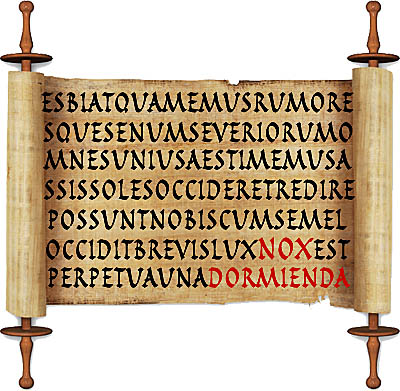
Quaeris quot mihi basiationes?
You ask, my Lesbia, how many of your kisses
are enough and more than enough for me.
As big a number as the Libyan grains of sand
that lie at silphium producing Cyrene
between the oracle of Sultry Jupiter
and the sacred tomb of old Battus;
Or as many stars that see the secret love affairs of men,
when the night is silent.
So many kisses are enough
and more than enough for mad Catullus to kiss you,
these kisses which neither the inquisitive are able to count
nor an evil tongue bewitch.
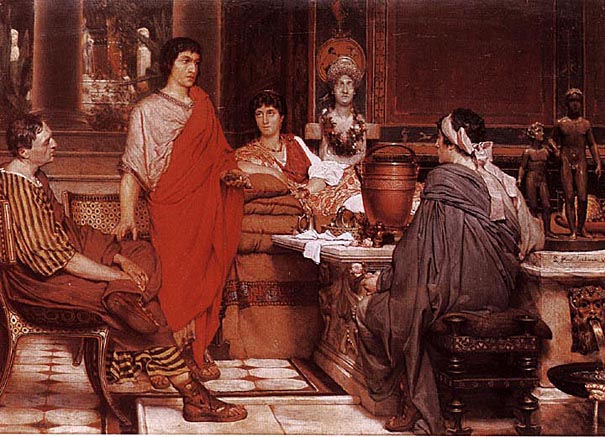
Catullus et Lesbia
Miser Catulle, desinas ineptire
Poor Catullus, you must stop being silly,
and count as lost what you see is lost.
Once the sun shone bright for you,
when you would go whither your sweetheart led,
she who was loved by me as none will ever be loved.
Then there took place those many jolly scenes
which you desired nor did your sweetheart not desire.
Truly the sun shone bright for you.
Now she desires no more: do you too, weakling, not desire;
and do not chase her who flees, nor live in unhappiness,
but harden your heart, endure and stand fast.
Goodbye, sweetheart. Catullus now stands fast:
he will not look for you or court you against your will.
But you will be sorry when you are not courted at all.
Wretch, pity on you! What life lies in store for you!
Who will come to you now? Who will think you pretty?
Whom will you love now? Who will people say you are?
Whom will you kiss? Whose lips will you bite?
But you, Catullus, be resolute and stand fast.
Odi et Amo
I hate and I love. Wherefore would I do this, perhaps you ask?
I do not know. But I feel that it happens and I am tortured.
View of Love
Catullus' vision of love in his poems is far different from the casual, frequent, and merely sensual liaisons represented in the elegant dilettantish poems of the "new poets." In his poems Catullus imagines a kind of relationship with a woman which may be called total involvement, intellectual as well as physical. This concept of love, taken for granted today, combines friendship with sensual pleasure. Catullus' affair with Clodia was itself probably not unique, but it did provide the poet with a starting point from which to develop his concept of an ideal love.
Catullus could be witty and charming, as in poem 13, an "invitation" to one Fabullus to dine with him--but he must bring his own dinner, for the poet's wallet is full of cobwebs. Nonetheless the host will provide a scented ointment, on smelling which Fabullus will pray to the gods to become all nose. Catullus could be witty and obscene, as in poem 39, on a certain Egnatius, who continually grins, whether appropriately or inappropriately, in order to show off his brilliant white teeth. The secret of his beautiful smile, however, is the urine with which he cleans them. Many of the poems are forthrightly obscene to a degree that may shock even modern readers (32, 33, 37, 80, and 97). There are two lampoons of Caesar (29 and 57), which the great man conceded had hurt him. When Catullus apologized for them, however, Caesar promptly invited him to dinner.
Other Themes
The long poems exhibit another side of Catullus' talent. Poem 61, a wedding hymn written in honor of the marriage of a friend, has a grace and sensitivity which make it one of his most delightful poems. The same holds true of 62, another wedding hymn but without reference to a particular marriage. Poem 64, on the marriage of Peleus and Thetis, is highly finished and subtle and was written for, and best understood by, a learned elite. In addition there are 76, the poet's plea to the gods to allow him to gain an ultimate perspective on the love that has consumed him like a disease, and 101, commemorating a visit to his brother's tomb and ending with the simple but expressive atque in perpetuum, frater, ave atque vale ("But now for all time, my brother, good luck and farewell").
A critic called Catullus' little book of poems "maddeningly scrappy." The poems are indeed uneven in quality, and many are difficult to understand. Nevertheless he wrote a new kind of poetry which influenced poets for two generations after his death. His direct personal lyricism gives a quality to many of them which makes them similar to modern lyric poems.

Lesbia and her Sparrow
This page is the work of Senex Magister
Return to Persona Historiae
Return to Pagina Artis
Return to Bruce and Bobbie's Main Page.











